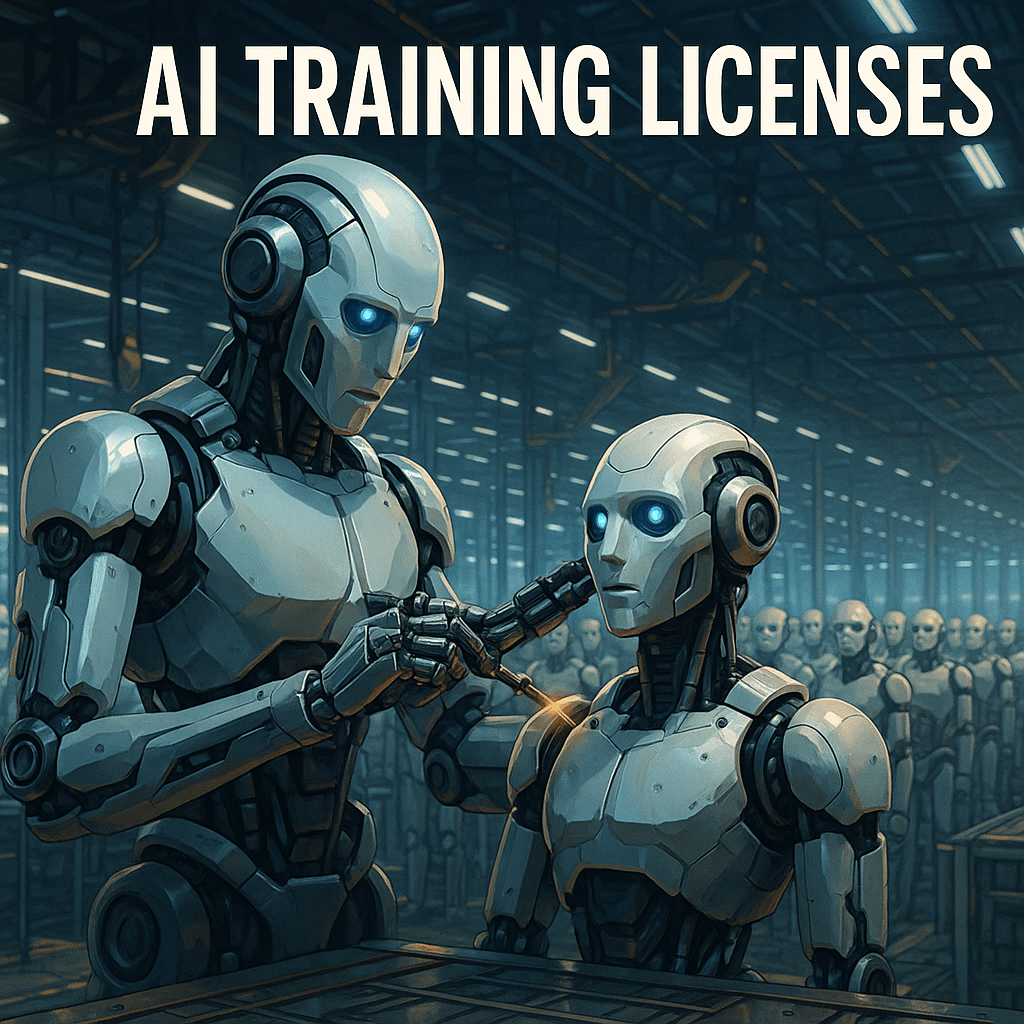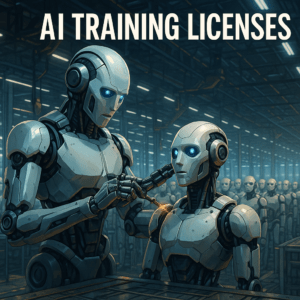Training an AI model is not just a data science problem, it’s a legal one. At the heart of every AI system is a training dataset, which may include copyrighted text, images, audio, video, or software code. For founders and developers, the temptation to “scrape now and figure it out later” can lead to costly litigation, regulatory attention, and reputational damage. That’s why understanding AI training licenses is mission-critical from day one.
What Is an AI Training License?
An AI training license is a legal agreement that grants a developer or company the right to use specific content — whether datasets, copyrighted materials, or proprietary software — for the purpose of training machine learning models. This is not the same as a typical end-user license agreement (EULA) or open-source license. AI training involves reproducing, transforming, and ingesting large volumes of third-party content in ways that may trigger copyright or database protection laws. Licenses must be purpose-built to reflect these uses and mitigate infringement risks.
Does Fair Use Apply to AI Training?
This is one of the most commonly asked questions, and one of the most misunderstood. While some academic uses of copyrighted content for non-commercial AI research may fall under the doctrine of fair use, commercial use cases rarely do. Courts have yet to definitively rule on how fair use applies to large-scale AI training by private companies. Given the unsettled landscape, the best legal strategy is to operate under explicit licensing agreements rather than relying on broad fair use assumptions.
What Types of Content Require AI Training Licenses?
Startups developing AI systems may need training licenses for a wide variety of content categories, including:
- Text: Books, articles, blog posts, legal documents, forum threads, and more.
- Image datasets: Photographs, illustrations, medical images, and other visual content.
- Audio and video: Speech recordings, interviews, music, and film content.
- Source code: GitHub repositories, SDKs, or open-source libraries — especially when modifying or fine-tuning LLMs for developer tools.
- Structured data: Proprietary datasets like financial records, patient health records (HIPAA), or customer behavioral data.
Each category implicates different IP rights such as copyright, trade secrets, privacy, and therefore, different licensing structures.
Where Do Startups Get Licensable AI Training Data?
There are three primary sources:
- Public domain or open-license datasets — Datasets like Common Crawl, LAION, or government open data portals are popular, but often contain mixed or questionable provenance. Even “open” data must be vetted carefully for license scope and attribution rules.
- Directly licensed data — Some vendors offer datasets specifically for commercial AI training, with well-defined usage rights. This may involve licensing from publishers, image banks, or even competitors.
- User-generated or proprietary data — If your startup collects its own data (e.g., customer interactions, sensor logs), ensure your privacy policy and terms of use allow such data to be used for model training. This is especially important when dealing with biometric data, health data, or minors.
 What Happens If You Train on Unlicensed Data?
What Happens If You Train on Unlicensed Data?
The consequences of using unlicensed data for AI training can include:
- Copyright infringement lawsuits, especially from media organizations and content creators.
- Trade secret misappropriation if proprietary datasets were scraped or leaked.
- Regulatory scrutiny under privacy laws like GDPR, CCPA, and HIPAA if personal or health data is involved.
- Litigation delays and investor red flags during due diligence or funding rounds.
- Model takedowns or required retraining under court orders.
As the public and legal scrutiny around generative AI intensifies, these enforcement actions are becoming more frequent and less predictable. Avoiding them starts with a robust AI training licensing strategy.
How to Structure an AI Training License Agreement
The optimal AI training license agreement should address the following key terms:
- Scope of use: Clearly define that the licensed content may be used for training, fine-tuning, evaluation, and possibly downstream commercial applications of the AI model.
- Attribution: Some licenses require attribution in the resulting product or dataset.
- Exclusivity: Determine whether your license is exclusive or non-exclusive.
- Revocability: Can the licensor revoke the license unilaterally?
- Audit rights: Licensors may ask for logs or metadata to confirm how their data was used.
This is not boilerplate — each term should be tailored to the type of data, the field of use (e.g., healthcare vs. retail), and the jurisdictions involved.
Q&A: Common Legal Questions About AI Training Licenses
Do I need a license for synthetic or generated content?
If your AI is trained on synthetic content (i.e., data generated by another AI), the licensing question depends on who owns the underlying source content. If that synthetic content includes copyrighted or derivative materials, then yes — you may need a license.
Can I just use open-source datasets?
Some open-source datasets are permissively licensed for AI training, but many are not. For example, using Creative Commons-licensed images may be allowed in some contexts, but many CC licenses prohibit commercial use or require attribution. Always verify the scope.
Is scraping the web for training data legal?
It depends. Courts have generally allowed scraping of publicly available data in some contexts (e.g., hiQ Labs v. LinkedIn), but that does not resolve the copyright issue. Web scraping alone does not confer the right to reproduce or modify that data in an AI model.
Best California Lawyer for AI Training Licenses for Founders
In today’s competitive AI startup environment, rushing to ship features can sometimes come at the expense of legal foresight. But when it comes to AI training licenses, startups cannot afford to be careless. The right licensing strategy is not just about compliance — it’s about future-proofing your model, preserving your valuation, and avoiding explosive litigation down the line.
At L.A. Tech and Media Law Firm, we help AI founders, engineers, and general counsel craft enforceable, customized licensing strategies that align with both legal risk and innovation goals. From dataset vetting to license negotiation and privacy integration, our team offers forward-thinking legal infrastructure for startups pushing the boundaries of what AI can do.
David Nima Sharifi, Esq., founder of the firm, is a nationally recognized IP and technology attorney with decades of experience in M&A transactions, startup structuring, and high-stakes intellectual property protection, focused on digital assets and tech innovation. Featured in the Wall Street Journal and CBS News and recognized among the Top 30 New Media and E-Commerce Attorneys by the Los Angeles Business Journal, David regularly advises founders, investors, and acquirers on the legal infrastructure of innovation. Schedule your confidential consultation now by visiting L.A. Tech and Media Law Firm or using our secure contact form.
Schedule your confidential consultation now by visiting L.A. Tech and Media Law Firm or using our secure contact form.



